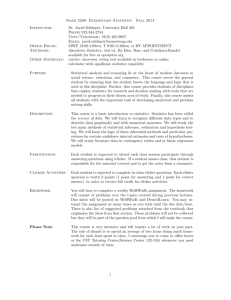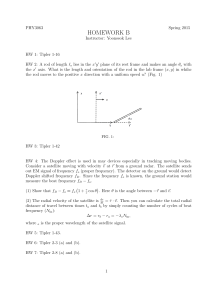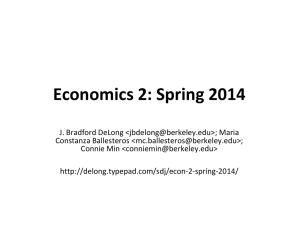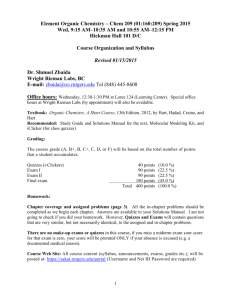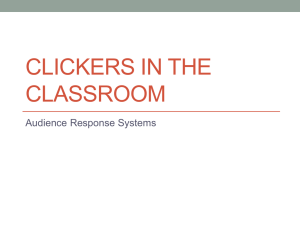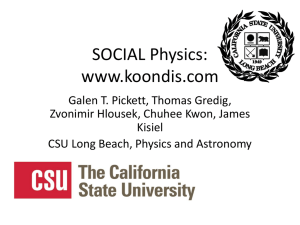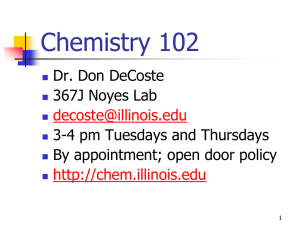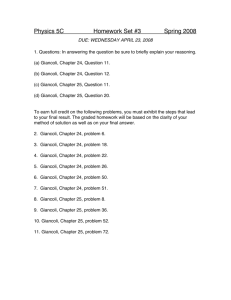- University of California, Berkeley
advertisement
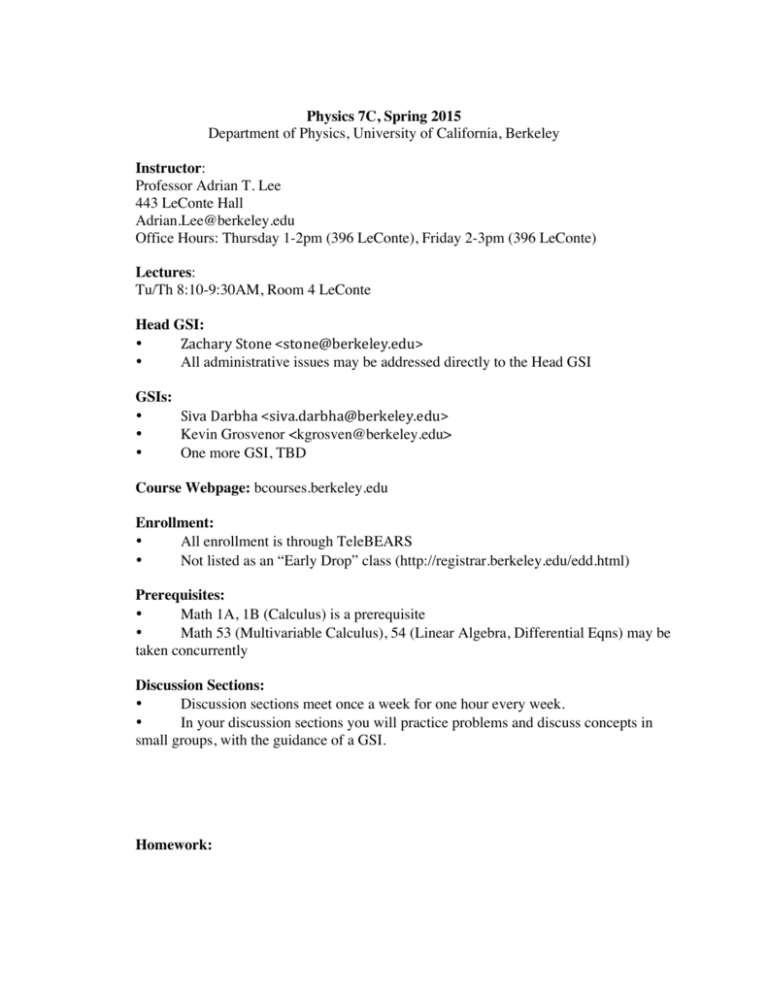
Physics 7C, Spring 2015 Department of Physics, University of California, Berkeley Instructor: Professor Adrian T. Lee 443 LeConte Hall Adrian.Lee@berkeley.edu Office Hours: Thursday 1-2pm (396 LeConte), Friday 2-3pm (396 LeConte) Lectures: Tu/Th 8:10-9:30AM, Room 4 LeConte Head GSI: • Zachary Stone <stone@berkeley.edu> • All administrative issues may be addressed directly to the Head GSI GSIs: • Siva Darbha <siva.darbha@berkeley.edu> • Kevin Grosvenor <kgrosven@berkeley.edu> • One more GSI, TBD Course Webpage: bcourses.berkeley.edu Enrollment: • All enrollment is through TeleBEARS • Not listed as an “Early Drop” class (http://registrar.berkeley.edu/edd.html) Prerequisites: • Math 1A, 1B (Calculus) is a prerequisite • Math 53 (Multivariable Calculus), 54 (Linear Algebra, Differential Eqns) may be taken concurrently Discussion Sections: • Discussion sections meet once a week for one hour every week. • In your discussion sections you will practice problems and discuss concepts in small groups, with the guidance of a GSI. Homework: • There will be weekly homework due Fridays at 7pm. It will be due on the Mastering Physics Website (Giancoli) or WebAssign (Tipler). You need to purchase a Mastering Physics code if you do not have one already from 7A/7B. Mastering Physics course ID: MPLEE94858. You also need to buy a Webassign code. Webassign course ID: berkeley 6856 2713 • No late homework will be accepted. We will drop your lowest two homework scores. • We encourage you to work with and help other students, however the homework you submit must ultimately be your own work. This means that while other students may teach you how to do a problem, you must eventually be able to solve the problem on your own. Labs: • There will be 7 labs throughout the semester; the lab section meets only during the weeks when a lab is scheduled. The lab manual can be purchased from Copy Central (at Bancroft and Bowditch, across from Hearst Field Annex). Prelab answers must be turned in at the beginning of the lab section. • If you miss a lab for a valid reason (e.g. illness) you must email your GSI to let them know the reason for your absence. To make up a missed lab, you should attend another lab section during that same week, also emailing that GSI ahead of time to let them know you will be attending their section. If you are not able to make up a lab in the week that it runs, one lab setup will also be available in each lab room the following week for makeups. You may only make up a lab in the following week once per semester. After that following week, you will not be able to make up the lab at all. • You are required to complete ALL labs: any uncompleted labs will result in a reduction of your grade by 1/3 of a letter grade for each lab missed. Exams: • You MUST be available to take all exams. Unresolvable conflicts with the exam dates must be discussed with the head GSI immediately. • All exams are closed book—you will be allowed one 3.5”x5” card (both sides) handwritten (or size 14 font or larger computer) notes for each MT and three for the final. • Exams will include both conceptual questions similar to the clicker questions as well as quantitative problems similar to homework problems and quizzes. • Exam problems will be graded based on your solutions, not your answers. No credit will be given for correct answers without a clear reasoning and showing your work. Exam Schedule: Review Session for MT1: Saturday, 2/21/15, 2-4PM in 1 Pimentel Midterm 1 for Lec 1: Tuesday, 2/24/15, 7-9PM in 2050 Valley LSB Review Session for MT2: Saturday, 4/4/15, 2-4PM in 1 LeConte Midterm 2 for Lec 1: Tuesday, 4/7/15, 7-9PM in 2050 Valley LSB Final Review Session: TBD Final Exam: Exam Group 16 – Thursday, May 14, 2015, 7-10PM, room TBD Clickers: • Clickers are required for lecture. You will receive credit for participation only, not for correctness. • Clicker participation is extra credit: you clicker percentage will replace 2 percentage points of your total exam weighting only if your clicker percentage is higher than your exam percentage. We will start using clickers on the second week of lecture, but we will start counting the extra credit in the third week of class. • It is your responsibility to bring a functioning (with working batteries), properly registered iClicker (iclicker.com) to lecture every day. • There are no makeups for clicker questions. We will drop your 3 lowest days of clicker scores. • You must register your clicker with your name and student ID through the iClicker website (www.iclicker.com/support/registeryourclicker/) to receive credit. If your iclicker is incorrectly registered you will not receive clicker credit. Course Center: 109 Le Conte • The course center is designed to facilitate group work. It will be open during business hours whether or not there are office hours being held, so feel free to come to work individually or in groups any time. Required Course Materials: • Textbook 1: Giancoli, Physics for Scientists and Engineers, Special edition (4th ed) Volume3 • Textbook 2: Tipler, Llewellyn, Modern Physics, 6th edition • Clicker: iClicker Classroom Response System Grading: • The grade breakdown is the following: Midterm 1 Midterm 2 Final Exam Homework Labs/Discussion 20% 20% 40% 15% 5% • Clicker participation will act as extra credit: if you’re clicker percentage is higher than your total exam percentage, your clicker participation will count for 2% of your grade and your exams will count for 78% of your grade. • We will drop your lowest two homework scores, lowest quiz score, and 3 days worth of lowest clicker scores. • 7C grades will roughly follow department guidelines for grade distribution which are roughly 25% A’s, 40% B’s and 35% C’s. D’s and F’s. D’s and F’s will be given on a case-by-case basis to students displaying especially poor performance. • A grade of “Incomplete” is only given to students who have completed work that is at least “C” quality and are unable to complete the course due to circumstances beyond their control. Accommodations: • Students who require special accommodations for the class (e.g. for exams, lecture, labs) must contact the instructor at the beginning of the semester. Week Starting Date Lecture Topic and Reading Problem Set Lab 1 Jan. 19 Electromagnetic Waves No Lab Giancoli Ch. 31.1-4, 5, 6-9 2 Jan. 26 Reflection, Refraction, Polarization No Lab Giancoli Ch. 32.1,2,3,4,5 3 Feb. 2 Fresnel Equations No Lab Giancoli Ch. 32.6,7,8 4 5 Feb. 9 Feb. 16 Geometric Optics Giancoli Ch. 33.1,2,3,4 Reflection and Refraction of Light Optical Devices Geometric Optics Giancoli Ch. 33.6,7,8,9 6 Feb. 23 Interference No Lab Giancoli Ch. 34.1,2,3,4,5,6 MT1 7 March 2 Interference+Diffraction Michelson Interferometer Giancoli Ch. 35.1-35.9, 35.11 8 9 March 9 March 16 Relativity I Tipler Ch 1.1-1.6 Diffraction and Interference Relativity II Polarization Tipler Ch 2.1-2.2 10 March 23 SPRING BREAK March 30 Relativity III Photoelectric Effect Tipler 2.3-2.4 11 April 6 Quantum Nature of Light Tipler Ch 3.1, 3.2,3.3,3.4 MT2 12 April 13 Nuclear Atom Tipler Ch4: 1,2,3,4,5 Wave properties of particles Tipler Ch5:1,2,3,4,5,6,7 13 April 20 Quantum Mechanics Tipler Ch6:1-4, 5, 6 14 April 27 Atomic Physics Tipler Ch7, not required Solid State, Particle Physics, Cosmology Tipler Ch 10,12,13, not required Atomic Spectra
